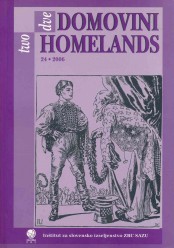CROATIAN EMIGRANTS IN CHILE AND IN THE REPUBLIC OF SOUTH AFRICA: A COMPARATIVE PRESENTATION OF TWO EMPIRICAL RESEARCHES
Keywords:
Croatian emigrants, Republic of South Africa, Chile, Croatian national identity, war of Independence, ethnicityAbstract
Among Croatian emigrants and their descendants in Chile and in the Republic of South Africa (RSA), a survey has been carried out in the period after the Croatian war of Independence to the international recognition of the Republic of Croatia with the aim of establishing the existence/non-existence of certain forms of national/ethnic identity. We have compared the answers of the respondents to define the degree of congruency of the questionnaire answers of two different emigrant groups.
By comparing the two researches, we have concluded that the emigrant population in RSA and in Chile have some distinctive characteristics: generation appurtenance, education, period of emigration, length of stay in the immigrant state. These factors have influenced directly on the degree of preservation of national/ethnic identity of emigrants as well as on the manner of demonstration of it.
The emigrant population in RSA is composed mainly of emigrants coming in after World War II. In RSA, that population was firmly connected with the Croatian Catholic Church, which was at the same time the main communal centre for assembling of the emigrants. The degree of preservation of national/ethnic identity among them is high. A large percentage of them are Croatian citizens, they know and speak Croatian language, and their children do so as well, and have great pretensions about returning to the homeland. In Chile, the number of emigrants arrived after World War II is small. The majority are born in Chile and are members of the second, third and fourth generations. They are mainly Chilean citizens, they do not speak and communicate in Croatian language, and the number of those that would return to Croatia is small. Despite previously alleged characteristic factors, we find congruency/accordance in the answers to the questions: membership in societies, degree of contentment accomplished in the immigrant state, preservation of ethnic customs within families, level of information on events in Croatia. These answers confirm the existence of a firm ethnic essence with the both surveyed populations. With both emigrant populations, we find a large number of members of Croatian emigrant societies through which they manifest their ethnic/national appurtenance. In RSA, the Croatian Catholic Church is the principle initiator for the assembling of emigrants while in Chile the majority of emigrant societies originate from the self-initiative wish of the emigrants to preserve their ethnic identity. They are mainly intellectuals; consequently, their societies have similar features (society of professionals of Croatian origin, Croatian-Chilean institute of culture, and similar). Within the both emigrant populations, the degree of contentment with the position and with the achieved in the immigrant state is high. Likewise, both emigrant populations are well informed on events in the homeland, the majority are in regular contacts with their families, and practice Croatian traditions within families.
Downloads
References
Antič, Ljubomir (1987). Naše iseljeništvo u Južnoj Americi i stvaranje jugoslavenske države 1918. Zagreb: Školska knjiga.
Antič, Ljubormir (1991). Hrvati u Južnoj Americi do godine 1914. Zagreb: Stvarnost.
Derado, Klement i Ivan Čizmič (1982). Iseljenici otoka Brača, Brački zbornik, Zagreb, br. 13.
Durkheim Emile (1981). Vaspitanje i sociologija. Beograd: Vaspitanje
Haralambos, Michael (1989). Uvod u sociologiju. Zagreb: Globus.
Holjevac, Večeslav (1968). Hrvati izvan domovine. Zagreb: Matica Hrvatska.
Lakatoš, Josip (1914). Narodna statistika. Zagreb: Vlastita naklada.
Laušič, Ante, Anič, Josip (2000). Južna Afrika i Hrvati. Zagreb: IMIN.
Letica, Silvija ur. (2001). Dodiri svjetova Hrvatska i Čile. Zagreb: Puljko.
Matrinić, Beroš Mateo (1997). Hrvati u Magallanesu, na krajnjem jugu Cilea. Split: Književni krug.
Mursalo, Tvrtko (1981). In Search o f a Better Life. A Storiy of Croatian Settlers in Southern.
Perič, Marina (2003). Obrasci transformacije identiteta hrvatskih iseljenika u Cileu, magistarski rad. Zagreb.
Ryan, E.B (1979). Why Do Low-Prestige Language Verietes Persist?, Language and Social Psychology. Oxford, 145-157.
Rosenberg, Peter, Harold, Weydt (1992). Sprache und Identität. Neues zur Sprachenwicklung der Deutschen in der Sowjetunion, Die Russlanddeutschen - Gestern und Heute, Köln, str 217-238.
Weber, Max (1976). Privreda i društvo. Beograd: Prosveta.
Zlatar Montan, Vjera (2002). Imigracion Croata en Antofagasta, Antofagasta, Chile.
Zivković, Ilija, Sporer, Željka, Sekulič, Duško (1995). Asimilacija i identitet, Zagreb: Skolska knjiga.
Downloads
Published
How to Cite
Issue
Section
License

This work is licensed under a Creative Commons Attribution-NonCommercial-NoDerivatives 4.0 International License.
Authors guarantee that the work is their own original creation and does not infringe any statutory or common-law copyright or any proprietary right of any third party. In case of claims by third parties, authors commit their self to defend the interests of the publisher, and shall cover any potential costs.
More in: Submission chapter





